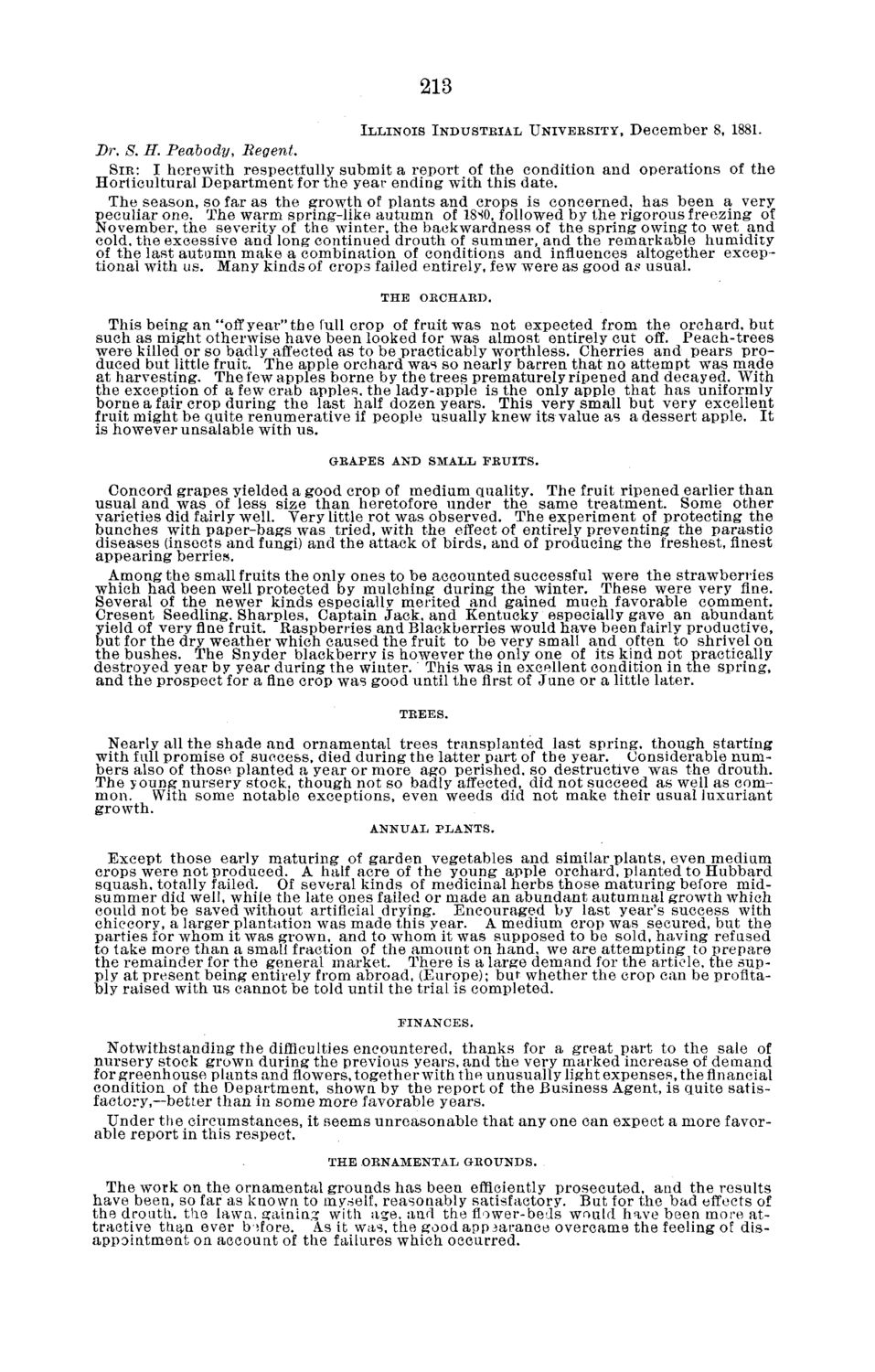| |
| |
Caption: Board of Trustees Minutes - 1882
This is a reduced-resolution page image for fast online browsing.

EXTRACTED TEXT FROM PAGE:
213 ILLINOIS INDUSTEIAL UNIVEESITY, December 8, 1881. Dr. S. H. Pedbody, Regent. SIE: I herewith respectfully submit a report of the condition and operations of the Horticultural Department for the year ending with this date. The season, so far as the growth of plants and crops is concerned, has been a very peculiar one. The warm spring-like autumn of 1830, followed by the rigorous freezing of November, the severity of the winter, the backwardness of the spring owing to wet and cold, the excessive and long continued drouth of summer, and the remarkable humidity of the last autumn make a combination of conditions and influences altogether exceptional with us. Many kinds of crops failed entirely, few were as good as usual. THE OECHAED. This being an "off year"the full crop of fruit was not expected from the orchard, but such as might otherwise have been looked for was almost entirely cut off. Peach-trees were killed or so badly affected as to be practicably worthless. Cherries and pears produced but little fruit. The apple orchard was so nearly barren that no attempt was made at harvesting. The few apples borne by the trees prematurely ripened and decayed. With the exception of a few crab apples, the lady-apple is the only apple that has uniformly borne a fair crop during the last half dozen years. This very small but very excellent fruit might be quite renumerative if people usually knew its value as a dessert apple. It is however unsalable with us. GEAPES AND SMALL F E U I T S . Concord grapes yielded a good crop of medium quality. The fruit ripened earlier than usual and was of less size than heretofore under the same treatment. Some other varieties did fairly well. Yery little rot was observed. The experiment of protecting the bunches with paper-bags was tried, with the effect of entirely preventing the parastic diseases (insects and fungi) and the attack of birds, and of producing the freshest, finest appearing berries. Among the small fruits the only ones to be accounted successful were the strawberries which had been well protected by mulching during the winter. These were very fine. Several of the newer kinds especially merited and gained much favorable comment. Cresent Seedling. Sharpies, Captain Jack, and Kentucky especially gave an abundant yield of very fine fruit. Raspberries and Blackberries would have been fairly productive, but for the dry weather which caused the fruit to be very small and often to shrivel on the bushes. The Snyder blackberry is however the only one of its kind not practically destroyed year by year during the winter. This was in excellent condition in the spring, and the prospect for a fine crop was good until the first of June or a little later. TEEES. Nearly all the shade and ornamental trees transplanted last spring, though starting with full promise of success, died during the latter part of the year. Considerable numbers also of those planted a year or more ago perished, so destructive was the drouth. The young nursery stock, though not so badly affected, did not succeed as well as common. With some notable exceptions, even weeds did not make their usual luxuriant growth. ANNUAL PLANTS. Except those early maturing of garden vegetables and similar plants, even medium crops were not produced. A half acre of the young apple orchard, planted to Hubbard squash, totally failed. Of several kinds of medicinal herbs those maturing before midsummer did well, while the late ones failed or made an abundant autumnal growth which could not be saved without artificial drying. Encouraged by last year's success with chiccory, a larger plantation was made this year. A medium crop was secured, but the parties for whom it was grown, and to whom it was supposed to be sold, having refused to take more than a small fraction of the amount on hand, we are attempting to prepare the remainder for the general market. There is a large demand for the article, the supply at present being entirely from abroad, (Europe); but" whether the crop can be profitably raised with us cannot be told until the trial is completed. FINANCES. Notwithstanding the difficulties encountered, thanks for a great part to the sale of nursery stock grown during the previous years, and the very marked increase of demand for greenhouse plants and flowers, together with the unusually light expenses, the financial condition of the Department, shown by the report of the Business Agent, is quite satisfactory,—better than in some more favorable years. Under the circumstances, it seems unreasonable that any one can expect a more favorable report in this respect. THE OENAMENTAL GEOUNDS. The work on the ornamental grounds has been efficiently prosecuted, and the results have been, so far as known to myself, reasonably satisfactory. But for the bad effects of the drouth, the lawn, gaining with age, and the flower-beds would have been more attractive than ever before. As it was, the good appearance overcame the feeling of disappointment on account of the failures which occurred.
| |